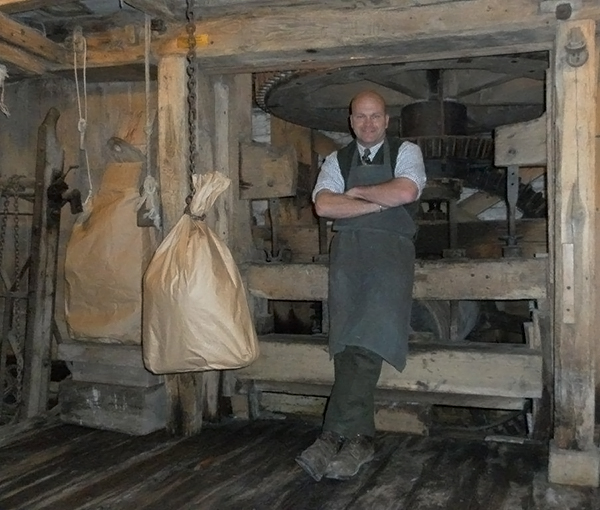At our February meeting Corry Starling gave us an outstanding talk on Mapledurham Water Mill, the last commercially operated mill on the River Thames. A mill has existed on the site for over a thousand years and is referred to in the Doomesday Book: Mill and ten acre farm, twenty shillings.
The mill is part of the two and a half thousand acre Mapledurham estate which has been in the same family since 1492. Corry described the early history of the mill until the 1960’s when it became almost derelict. In it’s heyday five men and four boys were employed and two channels fed two wooden water wheels. It was one of the few mills to include a dressing machine so that white flour could be produced and this attracted premium prices from London merchants living in the neighbourhood.
The estate realised that other sources of income were required to support the mill and other buildings on the estate and a series of filming events fulfilled this requirement, starting with “The Eagle has Landed” in the 1970’s. Since them Midsomer Murders and Miss Marple have visited and the mill even featured on a Black Sabbath album cover. All of these now have large numbers of international fans keen to visit the site.
Corry and his wife moved into the village in 1999 for an eighteen month stay and have been there ever since. In 2012 they accepted the offer from the estate to rent the mill and shop. Since then they have completely overhauled the premises including a thorough clean from top to bottom and redressing the millstones. The wooden water wheel has been rebuilt and a derelict water turbine removed from the other wheel pit. In it’s place has been installed a state of the art Archimedes Screw water turbine which produces about 500,000KWhr per year. The deal with the National Grid means the scheme will pay for itself about half way through the twenty year contract.
Mr Starling gave a lively and informative description of the mill, it’s workings and his role as miller. It was clear to his audience that in addition to his great passion, Corry has considerable expertise and understanding of every aspect of the water mill. We were particularly enthralled by his description of a safety device consisting of a leather strap, a cord and a bell, designed to warn the miller on the floor below when the hopper was running low on grain. If the millstones operate without this feed there is a risk of fire. He emphasised the key influence weather and river levels can have on operations, including compete stoppage during flooding.
Mrs Starling is an expert baker and offers a range of speciality baking mixtures in addition to the various flours produced by the mill. This has transformed the shop so that all the flour produced is sold on the premises.
The History Society is planning a visit to the mill on Saturday June 18th and details will be posted on our website www.history-society.org.

